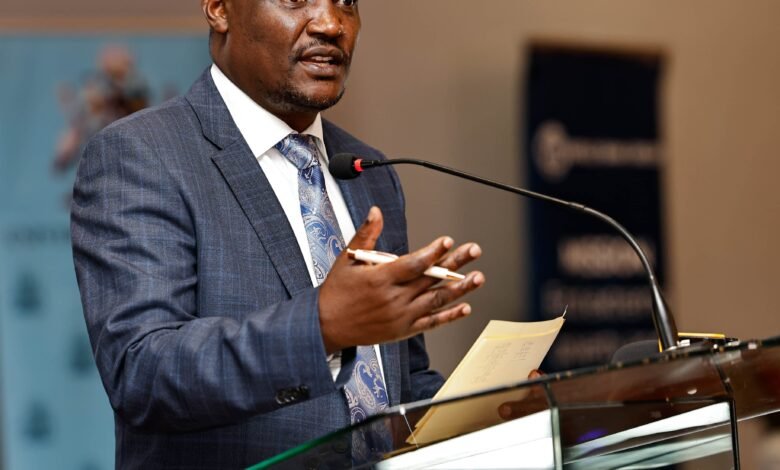
John Mbadi will present his first budget since assuming the reigns at Treasury on Thursday on Thursday, as he looks at boosting revenues to service debt while avoiding tax measures that triggered the kind of deadly protests that rocked the country.
Mbadi was appointed Treasury Cabinet Secretary on July 24, 2024, replacing Njuguna Ndungu, President William Ruto’s first Treasury head from 2022.
President Ruto’s administration has been struggling to narrow the fiscal deficit and govern under a heavy total debt-to-GDP ratio of around two-thirds, well above the 55% level considered a sustainable threshold.
The government is seeking new sources of funding after last year’s countrywide protests forced it to pursue austerity measures and scrap planned tax hikes worth more than 346 billion Kenyan shillings ($2.7 billion).
“Kenyans cannot bear more tax,” Finance Minister John Mbadi said on Wednesday. “For the first time, we have not added taxes in the current finance bill as has been the case before.”
Critics have accused the government of using the budget to increase indirect taxes and infringe on privacy by empowering the tax authority to spy on people’s bank accounts and mobile money transactions. But Mbadi said on Wednesday the revenue authority must be empowered to collect taxes to run the country.
In place of hiking individual taxes, Mbadi is looking to widen the tax base, improve compliance and cut spending, said John Kuria, a tax specialist and partner at Kody Africa.
Also Read: Treasury CS Mbadi Announces Measures for Increased Revenue, Country’s Stability
“They understand that people are not very happy, especially with the government and how the taxes are being used,” Kuria said.
Despite government attempts to tighten expenditure and crack down on fraud, “I think we’re still going to have a significant funding shortfall,” he said.
While the proposed budget outlines credible measures to reduce the fiscal deficit, the challenge lies in implementation, which Kenya has struggled with historically, said Shani Smit-Lengton, Senior Economist at Oxford Economics Africa.
This often results in mid-year revisions through supplementary budgets, which erode fiscal credibility, Smit-Lengton told Reuters via email.
Kenya said in March it had applied for a new lending programme from the International Monetary Fund (IMF) after abandoning the final review on the previous IMF programme.
In February it joined a fast-growing club of African nations that have gone to the market to borrow cash to pay off maturing debts in a bid to smooth out liabilities and ring-fence critical expenditures like health.
“This year, the stakes are higher: the government must demonstrate improved budget discipline to bolster its case for a new IMF programme, while also managing public sentiment to avoid social unrest.
“Achieving this balance will be critical to maintaining both investor confidence and domestic stability,” Smit-Lengton said, adding that the government’s target of reducing the fiscal deficit to 4.5% in the next financial year was overly optimistic.






Magnificent goods from you, man. I have understand your stuff previous to and you are just too great. I actually like what you have acquired here, certainly like what you’re saying and the way in which you say it. You make it entertaining and you still care for to keep it smart. I can’t wait to read far more from you. This is actually a great website.
Can I simply say what a relief to find someone who really is aware of what theyre speaking about on the internet. You definitely know the right way to deliver an issue to mild and make it important. Extra people must read this and perceive this facet of the story. I cant believe youre no more popular because you definitely have the gift.
Robin Norwood explica el ciclo de dependencia emocional claramente https://lasmujeresqueamandemasiadopdf.cyou/ Descarga gratis y aprende a romperlo. Más de 336 páginas de sabiduría práctica.
¿Te conformas con menos de lo que mereces por miedo? Cambia eso https://lasmujeresqueamandemasiadopdf.cyou/ Descarga gratis el bestseller de Robin Norwood. Tu valor no es negociable.
El primer paso hacia relaciones sanas es entender los patrones tóxicos https://lasmujeresqueamandemasiadopdf.cyou/ Descarga gratis Las Mujeres Que Aman Demasiado. Tu transformación comienza hoy.
Whats Going down i’m new to this, I stumbled upon this I’ve discovered It absolutely useful and it has aided me out loads. I am hoping to give a contribution & help different users like its helped me. Good job.
Construye relaciones basadas en el respeto mutuo. Descubre cómo en https://lasmujeresqueamandemasiadopdf.cyou/ El libro que toda mujer debería leer. Descarga gratuita del bestseller completo.
¿Minimizas problemas graves en tu relación? Es hora de ser honesta https://lasmujeresqueamandemasiadopdf.cyou/ Descarga gratis el libro que te ayudará a ver con claridad. No esperes más.
I carry on listening to the rumor lecture about getting free online grant applications so I have been looking around for the most excellent site to get one. Could you tell me please, where could i get some?
You are my aspiration, I have few blogs and often run out from to post .
This is the right weblog for anyone who needs to search out out about this topic. You understand a lot its nearly laborious to argue with you (not that I actually would want…HaHa). You positively put a new spin on a subject thats been written about for years. Nice stuff, simply great!
I truly appreciate this post. I have been looking all over for this! Thank goodness I found it on Bing. You have made my day! Thanks again
I simply could not go away your web site prior to suggesting that I extremely loved the standard info an individual supply to your visitors? Is going to be back frequently in order to check up on new posts.